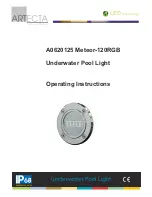
Once the liner is held securely in place by coping, temporarily pull wrinkles in the floor towards the side wall evenly,
leaving the wrinkles at the cove. When the liner is correctly positioned, there must be no air space between the liner and
the ground or side wall. Remove wrinkles at the cove by adjusting the amount of material over the wall. Do not pull too
tight- leave the slack on the sides. When a liner is properly installed there is no downward pressure on the liner. The
liner could pull in if it is hung too tightly.
Start filling the pool. When the water is no more than 1” deep, check for levelness. If water runs to one side, pull
back the liner and make the ground level. When level, continue to fill and adjust the liner. Do not cut the skimmer and
skimmer return holes in the liner until fully adjusted and the pool is 1/3 filled.
INCORRECT!
DO NOT LEAVE A GAP BETWEEN LINER
AND COVE. THIS WILL CAUSE
DOWNWARD PRESSURE ON THE LINER.
CORRECT THIS CONDITION IF IT OCCURS.
CORRECT
NO AIR SPACE BETWEEN
LINER AND POOL - SLACK ON SIDES.
STEP 12: LINER ADJUSTMENT (For Overlap liners ONLY)
STEP 13: INNER STABILIZER ADJUSTMENT
When the liner is completely adjusted and the plastic coping is secured, push the first inner stabilizer rail over the
plastic coping so that it fits snugly (starting at the wall bolts is usually a good idea). Be sure to leave one end of the
stabilizer slightly raised so that the next stabilizer can interlock as shown below. As they are progressively installed
around the circumference of the pool, note that the tapered end of the stabilizer easily telescopes into the un-tapered
end of the following stabilizer. The tapered end should be inserted approximately 1” into the adjacent stabilizer. This
allows room for adjustment either in or out. In this way, the last stabilizer may be fitted into place by adjusting the
other stabilizer rails as needed.
*Roll overlap liner up inward to hide excess
underneath top rail. (Rolling inward will
prevent water from collecting in flap.)
Do not trim excess - this may cause liner to pull in!
Plastic Coping
or Beaded
Liner Track
Inner Stabilizer Rail
Liner
Summary of Contents for Above Ground Pool
Page 16: ......



































